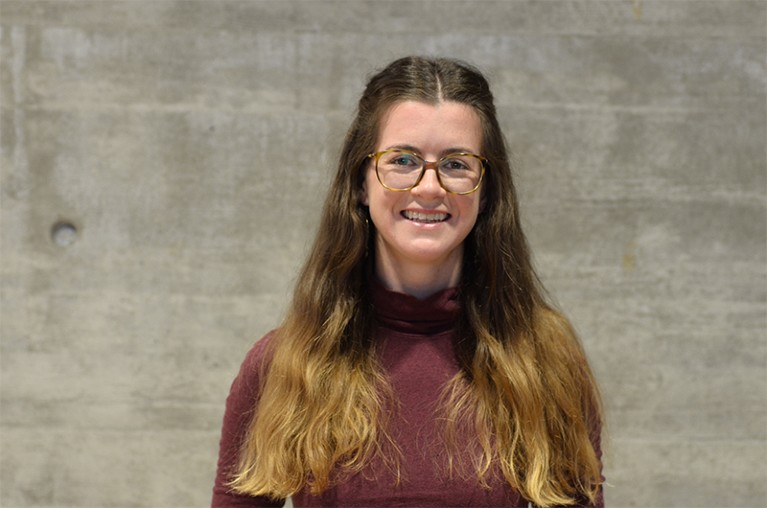
Celina Love moved to the Max Planck Institute of Molecular Cell Biology and Genetics in Dresden in 2016 to work on synthetic biological symptoms. She says she was shocked by the xenophobia she saw in the city, and has been involved in speaking out against it.
Why did you decide to do your PhD in Dresden?
It was serendipity. I work in synthetic biology and research the factors that influence enzyme reactions. After I finished my master’s degree at the University of Bristol in the United Kingdom, my former supervisor Dora Tang moved to the Max Planck Institute of Molecular Cell Biology and Genetics in Dresden and asked me to join her. I wanted to go abroad, and I knew that Germany has a good quality of life.
What is it like to live there?
Dresden is a small city that has a great sense of history and culture. It also has a very international scientific community; only around a quarter of the PhD students are German. What I was surprised about and was not prepared for was the xenophobia that you sometimes see on the streets.
What happens?
An organization called Pegida has been marching every Monday for four years now, waving German flags and shouting xenophobic slurs. At times, thousands of people attend. It is a very overt form of racism that I find appalling. When they are marching, there is always this feeling of animosity on the streets, and some of my colleagues do not like going into the city. I have not been targeted directly, even though I am also a foreigner, because apparently for them I have the right colour of skin. This hypocrisy is infuriating.
Why did you co-write a letter speaking out against racism?
In September 2018, a PhD student from Egypt was verbally abused and physically intimidated on public transport. A person started shouting that the student should go back to the country that she came from, and then the person followed her. It is not the first time something like this has happened. So Peter Swekis, a spokesperson for doctoral candidates from the Max Planck Institute for Chemical Physics of Solids in Dresden, initiated the idea of publishing an open letter condemning this behaviour and advocating the importance of cross-border collaboration for the advancement of scientific research. I joined him, along with five others. Together we represent 550 PhD students from more than 60 countries who are scientifically active in Dresden. We co-wrote a letter and published it on the websites of the institutes. Our goal was to express solidarity with the victims of xenophobic abuse and bring attention to the issue.
The response was positive. The letter was reported on by local media. Most importantly, the person that was assaulted on public transport told me that the letter comforted her. That alone made it worth it. It was the first time I have been directly involved in activism against racism, although I have always cared about promoting equality within science. I am an active member of the Lise Meitner Society, and we work to promote the rights of women and minorities in science and mathematics. I helped to set up a group here in Dresden.
How is Germany’s research scene affected by xenophobia?
Science needs an open and accepting climate for ideas to flourish. Therefore, this kind of incident hurts the reputation of Dresden as a scientific community. I think we need to be more active in providing a counter-voice to what is happening. On 21 October 2018, around 13,000 people gathered to protest against Pegida's marches. We tried to organize for the PhD students to participate. Out of around 100 people, six or seven turned out. There could have been more, but it was a start.


 Career Guide: Germany
Career Guide: Germany
 An introduction to the complexities of the German research scene
An introduction to the complexities of the German research scene
 How Germany is winning at turning its research to commercial application
How Germany is winning at turning its research to commercial application
 Ten reasons to move to Germany as a researcher
Ten reasons to move to Germany as a researcher
 Scientists in Germany identify first hybrid hominin
Scientists in Germany identify first hybrid hominin
 The science of starting a new life
The science of starting a new life
 Germany faces its future as a pioneer in sustainability and renewable energy
Germany faces its future as a pioneer in sustainability and renewable energy
 The second coming of solar
The second coming of solar
 Ten research collaborations between Germany and the rest of the world
Ten research collaborations between Germany and the rest of the world
 Sexism is still a problem for German research
Sexism is still a problem for German research
 Preceded by 967 men: meet the first woman in charge of the 600-year-old Leipzig University
Preceded by 967 men: meet the first woman in charge of the 600-year-old Leipzig University
 Germany’s attitude to start-up firms is undergoing profound change
Germany’s attitude to start-up firms is undergoing profound change
 No more career headaches
No more career headaches




